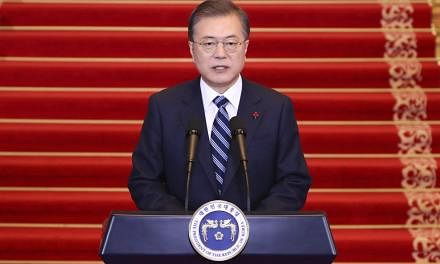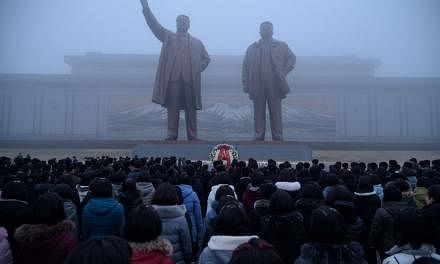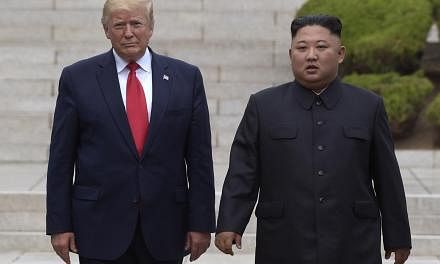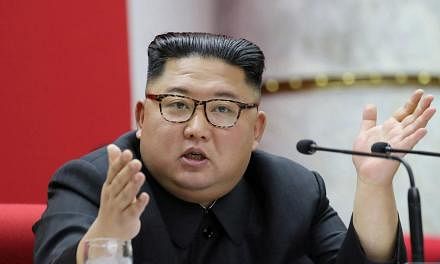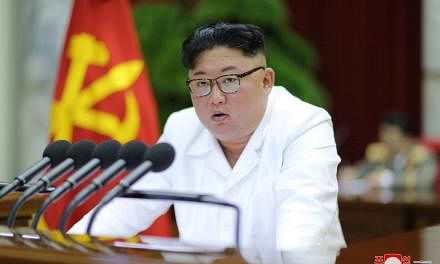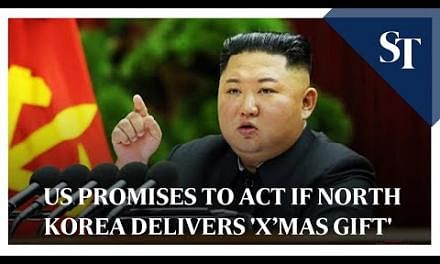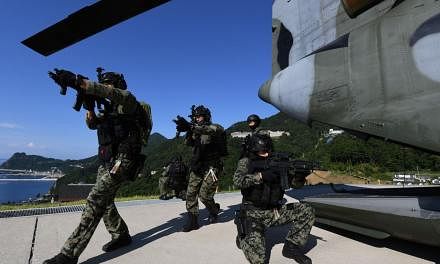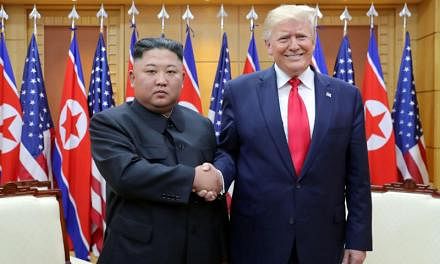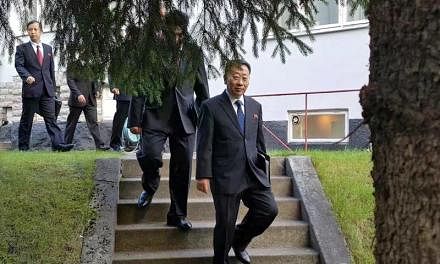TOKYO - The meeting between United States President Donald Trump and North Korean leader Kim Jong Un in Singapore is really about ensuring that matters do not get out of hand in the Korean peninsula, and not about denuclearisation, a retired top Singapore diplomat said on Tuesday (May 15).
"Agreeing to talk about denuclearisation is just a means to get the meeting going," said Mr Bilahari Kausikan, who retired as Ambassador-at-Large from Singapore's Ministry of Foreign Affairs this month, at The Wall Street Journal CEO Council meeting in Tokyo.
"How do you deal with a nuclear weapons state? There's only one way to deal with it, which is by deterrence. I think deterrence has been established after the previous US administration under (Barack) Obama allowed it to erode," he added.
But this view was disputed by South Korean presidential adviser and academic Moon Chung In later on Tuesday afternoon.
Dr Moon said denuclearisation is squarely on the table at the June 12 summit. He said: "Denuclearisation means the same thing to all parties - the complete, verifiable and irreversible dismantling of nuclear facilities, nuclear matters and nuclear weapons, and I see no difference among North Korea, the US, South Korea, but in terms of implementation of denuclearisation, there could be differences."
Dr Moon added: "President Trump wants to take all the nuclear weapons, and the intercontinental ballistic missiles out of North Korea and take them to the US where they will be dismantled. But North Korea has a different view."
He also said: "Chairman Kim wants to have an incremental and synchronised exchange based on the principle of action for action. There is a huge gap. (South Korean) President Moon Jae In has been trying to narrow the gap - there could be some kind of big deal at the beginning but the processes could take time."
The South Korean academic had noted Mr Kim's commitment to the denuclearisation process, as evident from his leaving his comfort zone for the Singapore summit.
Pyongyang has also invited journalists to inspect the decommissioning of the Punggye-ri nuclear test site in a ceremony to take place from May 23 to 25.
Dr Moon's comments came after Mr Kausikan told an audience of business leaders that Mr Trump and Mr Kim will discuss the level of arms control necessary to maintain deterrence - a discussion that "is not going to be settled in one meeting".
Thus, Mr Kausikan cautioned against looking at the June 12 summit in "binary terms of either-or, or success-failure", as many have been wont to do when it comes to foreign policy.
"The common mistake we make in these kinds of uncertain situations is to think in binary terms, the outcomes can only be either A or B," he added.
The summit between Mr Trump and Mr Kim in Singapore next month will be the first in history between the sitting leaders of the US and North Korea. That the pow-wow is even happening is to the credit of Mr Trump, Mr Kausikan said, who spoke "the language of deterrence" by speaking in a way that is "not how US presidents normally speak".
He was referring to Mr Trump's threats last year to "rain fire and fury" on Pyongyang, as tensions escalated.
This, he said, tapped the "essential logic of deterrence, which is 'If you do something I don't like, I'm going to kill you'". He added: "Kim understood that (and) reciprocated because he used extreme logic, and, in his case, asymmetrical deterrence. 'Yes, you can kill me but before I die, I'm going to tear off your arm'."
This led to a re-establishment of deterrence "at that crude level", Mr Kausikan said, and the summit will be to stabilise this form of deterrence. "Can I give you some reassurance so that you can reduce your level of capabilities? That's what they're going to talk about."
The retired diplomat holds a relatively positive assessment of Mr Trump.
He told the forum: "I look at what he does and not what he says. What he does in East Asia, in politics and security, has either been a historical continuation or in some respects, better than his predecessors."
"When Obama drew a red line in Syria and failed to enforce it, it eroded the credibility of US power in this part of the world and the credibility of deterrence in North Korea. Trump has restored it," he said, though he noted that the US, under Mr Trump, has a "narrower and less generous concept of global leadership".
Mr Kausikan also caused ripples in the audience when he mooted the controversial idea that it would be inevitable for Japan to one day acquire nuclear capabilities, within the framework of its security alliance with the US.
The prospect of acquiring nuclear weapons is anathema to Japan, which is the only country in the world to have suffered from atomic bombings.
There are fears within Tokyo and Seoul that Washington might strike a quick deal with the North to dismantle its intercontinental ballistic missiles, but leave in place short- and intermediate-range missiles and conventional weapons that leave them in the crosshairs.
Mr Kausikan, however, noted that the US-Japan Nuclear Cooperation Agreement in 1987 already allows Japan to repossess American supply of nuclear material.
He said: "North Korea is the catalyst and not the cause - it's really about China. Sooner or later, China will have a credible second-strike capability, and then questions will be asked if Washington or San Francisco or Denver will be sacrificed to save Tokyo. The answer is obviously 'no'."
"This was coming, and North Korea accelerated the issue," he added.
He said: "A nuclear balance of terror in North-east Asia may well be more stable than the present situation. People don't want to think about the uncomfortable, but this is not a dramatic scenario. It is a very simple scenario that has been on the cards for a very long time."


